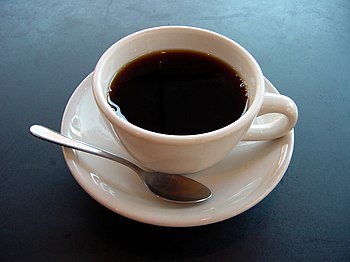What Is Caffeine?
It is a stimulant. It is designed to perk you up and get your blood flowing faster. Blood vessels are dilated so you get more oxygen flowing. Caffeine is found in sodas, coffee, tea and chocolate. But is there such a thing as too much of it?
The Good
| Coffee (Photo credit: Wikipedia) |
Caffeine can open blood vessels so that other medication can reach the site of pain more easily. For someone suffering from a migraine headache, drinking a caffeinated soda or tea can provide quicker relief than a pill. It is not advised to drink a soda as your main remedy, but it can take the edge off while your medication is starting to work.
Let’s go back to those energy drinks. They don’t just keep you awake; they give you more energy. This is desirable for someone who has a lot to do and wants to get it done.
Remember that oxygen increase? As the blood vessels dilate, more blood can reach the brain and so can more oxygen. You can think more clearly from first thing in the morning.
That extra energy can assist with weight loss. Drinking energy drinks can help you get through a particularly tough workout. As the metabolism ramps up, your body burns more calories to help you lose weight.
The Bad
With the good also comes a bit of a downside. While caffeine can do all of these things, using it too much can lead to some potential problems.
| Energy drinks. (Photo credit: Wikipedia) |
When that much caffeine is going through your system, stopping it can make you a bit woozy. Caffeine withdrawal can lead to dizziness, blurry vision and headache. How ironic, since it can also help stop a migraine.
High blood pressure is also a factor. Many medications that contain caffeine (such as cold medicine) are being changed to a different formulation for those who have a history of high blood pressure. The caffeine can raise normal blood pressure which makes them even more dangerous for someone who has a diagnosis of hypertension.
Regular consumption of caffeine can also deplete your adrenal glands, leading to low energy, fatigue, inability to handle stress, sleep disorders, and a host of other health problems.
Are you a caffeine drinker? A little can be helpful but too much can backfire on you. It's okay to have a bit of caffeine once in a while, but try not to do it every day, and if you do, have no more than what is contained in 1 cup of coffee.


No comments:
Post a Comment